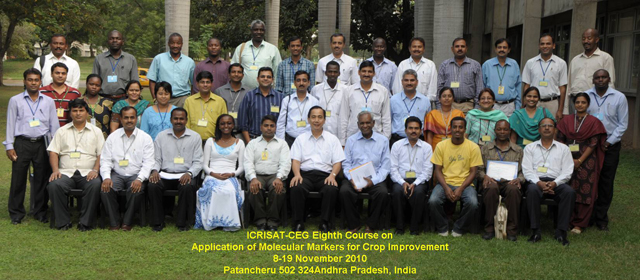Eighth ICRISAT CEG Course
Participants trained: 40 including 21 from India and 19 participants from 12 Asian/African countries
 The Eighth ICRISAT-CEG course on Application of Molecular Markers in Crop Improvement, held during 8-19 November 2010. A total of forty participants including 21 from India and 19 participants from 12 Asian/African countries are participating in this two week interactive training course. With this the ICRISAT-CEG has successfully imparted training to 200 participants. These 200 participants represent 25 ICAR Institutes, 5 CSIR (Council of Scientific and Industrial Research) institutes, 32 SAUs, 11 RRSs, 11 small seed companies, 3 Research Foundations from India and a number of institutes from 24 other Asian and African countries. About 25% of course participants have been female scientists. “Training of 200 breeders by CEG of ICRISAT and DBT is an important initiative in the area of capacity building. These efforts are very much required to initiate/ strengthen molecular breeding programme of NARS partners”, said Dr E A Siddique, Chair of Programme Monitoring Committee for CoEs of DBT.
The Eighth ICRISAT-CEG course on Application of Molecular Markers in Crop Improvement, held during 8-19 November 2010. A total of forty participants including 21 from India and 19 participants from 12 Asian/African countries are participating in this two week interactive training course. With this the ICRISAT-CEG has successfully imparted training to 200 participants. These 200 participants represent 25 ICAR Institutes, 5 CSIR (Council of Scientific and Industrial Research) institutes, 32 SAUs, 11 RRSs, 11 small seed companies, 3 Research Foundations from India and a number of institutes from 24 other Asian and African countries. About 25% of course participants have been female scientists. “Training of 200 breeders by CEG of ICRISAT and DBT is an important initiative in the area of capacity building. These efforts are very much required to initiate/ strengthen molecular breeding programme of NARS partners”, said Dr E A Siddique, Chair of Programme Monitoring Committee for CoEs of DBT.
“New science tools such as molecular markers will be very useful to accelerate crop productivity,” said Director General William Dar at the inaugural session of this course. Dr Dar said that gains from conventional plant breeding cannot meet future food demands and that there was a need for a major change in yield improvement. “ICRISAT firmly believes in the potential of biotechnology to enhance the speed, precision, efficiency and value addition of its crop improvement efforts, especially in addressing complex traits that have remained intransigent to conventional breeding,” he added. The Director General said that genomics has been providing breeders with new tools and novel approaches to perform their tasks with precision such as applications of molecular markers in breeding through marker-assisted selection (MAS). GTL-Biotechnology, Dr Oscar Riera-Lizarazu welcomed the gathering and urged the participants to exploit this training to the maximum and learn as much as possible from this course. Course Coordinator Rajeev Varshney gave a brief outline of the course and emphasized the importance of such capacity building exercises. Dr Rex Navarro, Global Leader (Acting), Knowledge Management and Sharing, outlined the activities of KMS and the importance of knowledge management and sharing. Dr Rajeev Varshney thanked the Department of Biotechnology, Government of India and the Generation Challenge Programme for financial support towards organization of the course. He expressed his gratitude to Dr Dar, DDG-R Dr Dave Hoisington, the Management Group and senior colleagues for their support for successfully conducting eight such courses over the last three years.
The Graduation Ceremony of the Eighth course was held on 19 November 2010. Speaking on the concluding ceremony, the Director General requested all the participants to enhance the capacity of their respective institutes by disseminating the knowledge gained through this course to their fellow colleagues. He also highlighted the challenges the scientists would need face like land degradation, erratic rainfall, increasing population, and dwindling of the resources. He emphasized the need of knowledge sharing across the institutes for increasing agricultural productivity. Prof EA Siddiq requested all the participants to implement what they learnt during this course. He also encouraged the participants to write project proposals on applying molecular markers for their interested trait for funding. Dr Rajeev Varshney thanked all the participants for their patience and informed that any participant can contact ICRISAT for any help in their research. He also indicated that the participants feed back/suggestions will be implemented wherever it is feasible. With this course the first phase of CEG training concludes, and ICRISAT already submitted the proposal for the II phase and hope the DBT will consider their proposal. Prof EA Siddiq and Dr Dar distributed the certificates to the participants.
